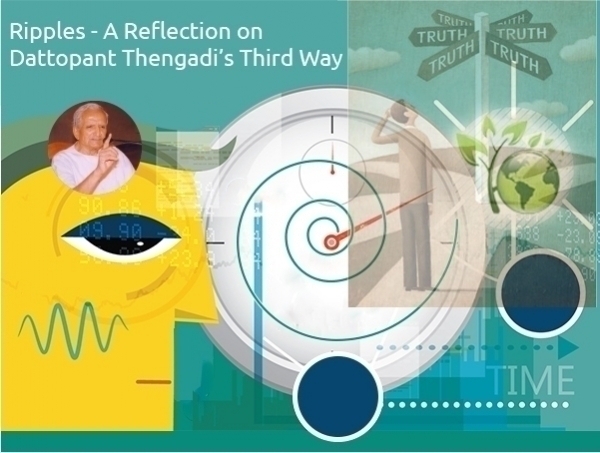Ripples A Reflection On Dattopant Thengadi's Third Way - Part 24
16 Apr 2022 11:40:40
I have been reflecting in my own way on Dattopant Thengadi Ji's Third Way. I present these small "ripples" that it has caused in my mind in a series. I am glad it has found its resonance in many thinking minds alike. I hope the readers have read the earlier article in the series before moving ahead.

Dattopant quotes Dr Ambedkar. He refers to his concluding speech in the constituent assembly. He pointed out the obvious contradiction where the constitution endorsed equality with 'one man one value', but in practice, it would be denied. If this contradiction persisted then sufferers of inequality would blow up the structure ' so labouriously built up'.
He wanted to protect the rights of 'the downtrodden'. At the same time, he emphasized that rights can only be safeguarded and guaranteed by the support of the social and moral conscience of society. So the public sentiments are to be molded. ( Reference Abraham Lincoln) The laws can be enforced by education and appeal to the mind and the spirit of society. Even similar observation is made by sage Narada.' When people bid good-bye to Dharma, disputes arise.'
The policy adopted was described as 'compensatory discrimination' by Mark Gallanter, a law professor at renowned universities.( The author of 'Competing Equalities') Of course he acknowledges that this is 'partly a result of scarcity of resources'.
Dattopant observes that in the democracy responsibility is the key concept but it is almost ousted from our political culture. The majority is equated to morality.
The things move only with violent agitations and precedents, healthy traditions and standards are not considered.
No legal protection or social justice can be expected by the small unorganised groups that are at the receiving end of many atrocities because they cannot form pressure groups. ( Dattopant gives an almost a comprehensive list of such small groups which need representations) He describes activists of Akhil Bhartiya Adhivakta Parishad as 'representatives of the moral and social conscience' and expresses the hope that they would work for the cause of providing the much needed relief to these marginalised groups.

Also Read: Ripples A Reflection On Dattopant Thengadi's Third Way - Part 23
Dattopant quotes Dr Ambedkar. He refers to his concluding speech in the constituent assembly. He pointed out the obvious contradiction where the constitution endorsed equality with 'one man one value', but in practice, it would be denied. If this contradiction persisted then sufferers of inequality would blow up the structure ' so labouriously built up'.
He wanted to protect the rights of 'the downtrodden'. At the same time, he emphasized that rights can only be safeguarded and guaranteed by the support of the social and moral conscience of society. So the public sentiments are to be molded. ( Reference Abraham Lincoln) The laws can be enforced by education and appeal to the mind and the spirit of society. Even similar observation is made by sage Narada.' When people bid good-bye to Dharma, disputes arise.'
The policy adopted was described as 'compensatory discrimination' by Mark Gallanter, a law professor at renowned universities.( The author of 'Competing Equalities') Of course he acknowledges that this is 'partly a result of scarcity of resources'.
Dattopant observes that in the democracy responsibility is the key concept but it is almost ousted from our political culture. The majority is equated to morality.
The things move only with violent agitations and precedents, healthy traditions and standards are not considered.
No legal protection or social justice can be expected by the small unorganised groups that are at the receiving end of many atrocities because they cannot form pressure groups. ( Dattopant gives an almost a comprehensive list of such small groups which need representations) He describes activists of Akhil Bhartiya Adhivakta Parishad as 'representatives of the moral and social conscience' and expresses the hope that they would work for the cause of providing the much needed relief to these marginalised groups.